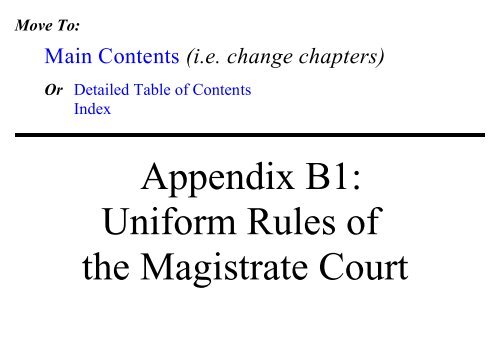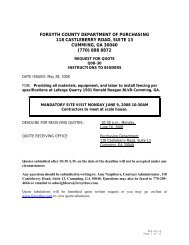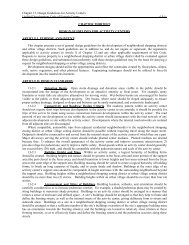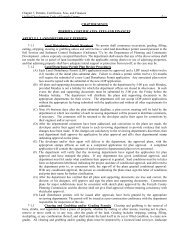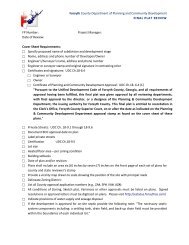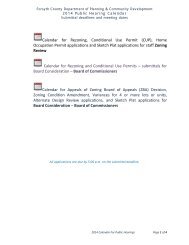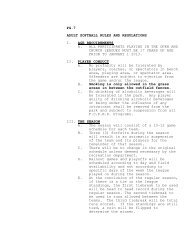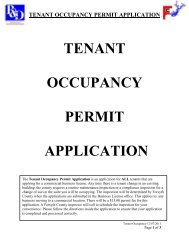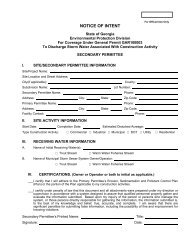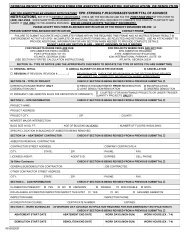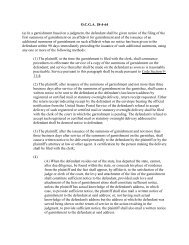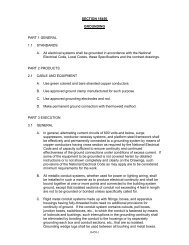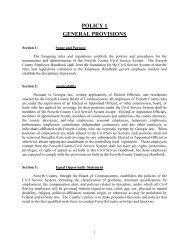B1 Uniform Rules of Magistrate Court - Forsyth County Government
B1 Uniform Rules of Magistrate Court - Forsyth County Government
B1 Uniform Rules of Magistrate Court - Forsyth County Government
You also want an ePaper? Increase the reach of your titles
YUMPU automatically turns print PDFs into web optimized ePapers that Google loves.
Move To:<br />
Main Contents (i.e. change chapters)<br />
Or Detailed Table <strong>of</strong> Contents<br />
Index<br />
Appendix <strong>B1</strong>:<br />
<strong>Uniform</strong> <strong>Rules</strong> <strong>of</strong><br />
the <strong>Magistrate</strong> <strong>Court</strong>
APPENDIX <strong>B1</strong> - UNIFORM RULES FOR THE MAGISTRATE COURTS<br />
<strong>B1</strong>. UNIFORM RULES FOR THE MAGISTRATE COURTS<br />
PART I. GENERAL AND ADMINISTRATIVE PROVISIONS<br />
Rule 1. Preamble.<br />
1.1. Repeal <strong>of</strong> local rules<br />
All local rules <strong>of</strong> the magistrate courts shall expire effective January 1, 1996. If<br />
any magistrate court by action <strong>of</strong> its chief magistrate proposes to prevent any<br />
local rule from expiring pursuant to Rule 1.1 then a proposal to prevent the local<br />
rule from expiring must be presented to the Supreme <strong>Court</strong> for approval 30 days<br />
prior to the expiration date as stated in Rule 1.1. Only those rules reapproved by<br />
the Supreme <strong>Court</strong> on or after January 1, 1996, shall remain in effect after that<br />
date. <strong>Rules</strong> timely resubmitted shall remain in effect until action by the Supreme<br />
<strong>Court</strong>.<br />
Editor's notes. - This rule was amended effective November 9, 1995.<br />
1.2. Authority to enact local rules which deviate from the <strong>Uniform</strong> <strong>Magistrate</strong> <strong>Court</strong><br />
<strong>Rules</strong><br />
(A)<br />
(B)<br />
The term "local rules" will no longer be used in the context <strong>of</strong> the<br />
<strong>Uniform</strong> <strong>Magistrate</strong> <strong>Court</strong> <strong>Rules</strong>.<br />
Each magistrate court by action <strong>of</strong> its chief magistrate, from time to<br />
time, may propose to make and amend rules which deviate from the<br />
<strong>Uniform</strong> <strong>Magistrate</strong> <strong>Court</strong> <strong>Rules</strong>, provided such proposals are not<br />
inconsistent with general laws, these <strong>Uniform</strong> <strong>Magistrate</strong> <strong>Court</strong> <strong>Rules</strong>,<br />
or any directive <strong>of</strong> the Supreme <strong>Court</strong> <strong>of</strong> Georgia. Any such proposals<br />
shall be filed with the clerk <strong>of</strong> the Supreme <strong>Court</strong>; proposals so<br />
submitted shall take effect 30 days after approval by the Supreme <strong>Court</strong>.<br />
It is the intendment <strong>of</strong> these rules that rules which deviate from the<br />
<strong>Uniform</strong> <strong>Magistrate</strong> <strong>Court</strong> <strong>Rules</strong> be restricted in scope.<br />
(Rev. 7/1/03)<br />
B - 1
VOLUME II<br />
(C)<br />
(D)<br />
(E)<br />
(F)<br />
Notwithstanding the expiration <strong>of</strong> previously approved local rules<br />
January 1, 1996, courts may continue to promulgate rules which relate<br />
only to internal procedure and do not affect the rights <strong>of</strong> any party<br />
substantially or materially, either to unreasonably delay or deny such<br />
rights. These rules, which will be designated "internal operating<br />
procedures," do not require the approval <strong>of</strong> the Supreme <strong>Court</strong>. "Internal<br />
operating procedures," as used in these <strong>Uniform</strong> <strong>Magistrate</strong> <strong>Court</strong> <strong>Rules</strong>,<br />
are defined as rules which relate to case management, administration,<br />
and operation <strong>of</strong> the court or govern programs which relate to filing<br />
costs in civil actions, costs in criminal matters, case management,<br />
administration, and operation <strong>of</strong> the court.<br />
Notwithstanding these uniform rules, a chief magistrate may promulgate<br />
experimental rules applicable to pilot projects, upon approval <strong>of</strong> the<br />
Supreme <strong>Court</strong>, adequately advertised to the local bar, with copies to the<br />
State Bar <strong>of</strong> Georgia, not to exceed a period <strong>of</strong> one year, subject to<br />
extension for one additional year upon approval <strong>of</strong> the Supreme <strong>Court</strong>.<br />
At the end <strong>of</strong> the second year, any such pilot projects will either be<br />
approved by the Supreme <strong>Court</strong> or will be allowed to sunset. Programs<br />
developed under the Alternative Dispute Resolution <strong>Rules</strong> <strong>of</strong> the<br />
Supreme <strong>Court</strong> will be approved by the Georgia Commission on Dispute<br />
Resolution before attaining permanent status under these rules.<br />
<strong>Rules</strong> which are approved as deviations from the <strong>Uniform</strong> <strong>Magistrate</strong><br />
<strong>Court</strong> <strong>Rules</strong> and internal operating procedures <strong>of</strong> courts shall be<br />
published by the judicial circuit in which the rules are effective. Copies<br />
must be made available through the clerk <strong>of</strong> the magistrate court for the<br />
county where the rules are effective. Any amendments to deviations<br />
from the <strong>Uniform</strong> <strong>Magistrate</strong> <strong>Court</strong> <strong>Rules</strong> or to internal operating<br />
procedures must be published and made available through each<br />
magistrate court clerk's <strong>of</strong>fice within 15 days <strong>of</strong> the effective date <strong>of</strong> the<br />
amendment or change.<br />
Internal operating procedures effective in any court must be filed with<br />
the Supreme <strong>Court</strong> even though Supreme <strong>Court</strong> approval is not needed<br />
for these rules.<br />
Editor's notes. - This rule was amended effective November 9, 1995.<br />
(Rev. 7/1/03)<br />
B - 2
APPENDIX <strong>B1</strong> - UNIFORM RULES FOR THE MAGISTRATE COURTS<br />
1.3. Matters <strong>of</strong> statewide concern<br />
The following rules, to be known as "<strong>Uniform</strong> <strong>Magistrate</strong> <strong>Court</strong> <strong>Rules</strong>," are to<br />
be given statewide application.<br />
Editor's notes. - This rule was amended effective November 9, 1995.<br />
1.4. Deviation<br />
These rules are not subject to local deviation except as provided herein. A<br />
specific rule may be superseded in a specific action or case or by an order <strong>of</strong> the<br />
court entered in such case explaining the necessity for deviation and served upon<br />
the attorneys in the case.<br />
Editor's notes. - This rule was amended effective November 9, 1995.<br />
1.5. Amendments<br />
The Council <strong>of</strong> <strong>Magistrate</strong> <strong>Court</strong> Judges shall have a permanent committee to<br />
recommend to the Supreme <strong>Court</strong> such changes and additions to these rules as<br />
may from time to time appear necessary or desirable.<br />
The State Bar <strong>of</strong> Georgia shall receive notice <strong>of</strong> the proposed changes and<br />
additions and be given the opportunity to comment.<br />
Editor's notes. - This rule was amended effective November 9, 1995.<br />
1.6. Publication <strong>of</strong> rules and amendments<br />
These rules and any amendments to these rules shall be published in the advance<br />
sheets to the Georgia Reports. Unless otherwise provided, the effective date <strong>of</strong><br />
any amendment to these rules is the date <strong>of</strong> publication in the advance sheets to<br />
the Georgia Reports.<br />
Editor's notes. - This rule was amended effective November 9, 1995.<br />
(Rev. 7/1/03)<br />
B - 3
VOLUME II<br />
Rule 2. Definitions.<br />
2.1. Judge<br />
2.2. Clerk<br />
The word "judge" as used in these rules refers to any person serving or acting as<br />
either a chief magistrate or magistrate in the <strong>Magistrate</strong> <strong>Court</strong>s <strong>of</strong> Georgia.<br />
The word "clerk" as used in these rules refers to the person designated as the<br />
clerk and to other members <strong>of</strong> the staff serving as deputy clerks. The chief<br />
magistrate may designate deputy clerks who shall have the same authority as the<br />
clerk.<br />
2.3. Party(ies)<br />
The word "party" or "parties" as used in these rules shall include law<br />
enforcement <strong>of</strong>ficers participating in criminal proceedings and attorney(s) <strong>of</strong><br />
record unless the context clearly indicates otherwise.<br />
2.4. Pronouns<br />
Repealed October 28, 1993.<br />
Rule 3. Hours <strong>of</strong> court operation.<br />
The hours <strong>of</strong> court operation shall be set by the chief magistrate <strong>of</strong> each court and shall<br />
be recorded with the clerk <strong>of</strong> the magistrate court. Such information shall include the<br />
following:<br />
(1) Normal hours and location <strong>of</strong> court.<br />
(2) Emergency after-hours availability <strong>of</strong> judges and the names <strong>of</strong> such judges.<br />
(3) Holidays during which the court will be closed and a plan for the availability <strong>of</strong><br />
judges on such days.<br />
(4) Days on which the court holds civil and criminal hearings (if not handled on the<br />
same day), and the times and locations <strong>of</strong> such hearing.<br />
Editor's notes. - This rule was amended effective November 9, 1995.<br />
(Rev. 7/1/03)<br />
B - 4
APPENDIX <strong>B1</strong> - UNIFORM RULES FOR THE MAGISTRATE COURTS<br />
Rule 4. Assignment <strong>of</strong> Cases.<br />
4.1. Case assignment<br />
If the caseload is such, the chief magistrate shall assign cases among the<br />
magistrates.<br />
4.2. Disqualification <strong>of</strong> judge<br />
If any judge is disqualified by law or judicial requirements from the hearing <strong>of</strong><br />
any case or other matter, such case or matter shall be referred to the chief<br />
magistrate for assignment or disposition.<br />
4.3. Disqualification <strong>of</strong> chief magistrate<br />
Rule 5. Dockets.<br />
If the chief magistrate is the judge disqualified, such case(s) shall be referred in<br />
rotation among the other magistrates in the county. The chief magistrate may<br />
provide by general order for the method <strong>of</strong> rotation and for selection <strong>of</strong> a court<br />
from which to request judicial assistance when all magistrates in a county are<br />
disqualified. Such general order shall apply only to cases where the<br />
disqualification arises after the date <strong>of</strong> the general order.<br />
5.1. Docket categories<br />
Each magistrate court shall keep a docket for criminal and search warrants, and<br />
a separate docket for all civil actions.<br />
5.2. Time <strong>of</strong> docketing<br />
Actions shall be entered by the clerk, deputy clerk, or magistrate in the proper<br />
docket immediately or within a reasonable period after being received in the<br />
clerk's <strong>of</strong>fice.<br />
Rule 6. Withdrawal <strong>of</strong> papers from magistrate court.<br />
No original papers may be withdrawn from the magistrate court. However, copies <strong>of</strong><br />
any documents may be obtained by any party or attorney for any party upon payment<br />
<strong>of</strong> copy cost to the clerk.<br />
(Rev. 7/1/03)<br />
B - 5
VOLUME II<br />
Rule 7. Duties <strong>of</strong> attorneys and all parties.<br />
7.1. Notification <strong>of</strong> representation<br />
No attorney shall appear in that capacity before a magistrate court until he has<br />
entered an appearance by filing a signed entry <strong>of</strong> appearance form or by filing a<br />
signed pleading in a pending action. An entry <strong>of</strong> appearance shall state (1) the style<br />
and number; (2) the identity <strong>of</strong> the party for whom the appearance is made; and (3)<br />
the name and current <strong>of</strong>fice address and telephone number <strong>of</strong> the attorney; and in<br />
criminal cases, the home telephone number <strong>of</strong> the attorney.<br />
In criminal cases, immediately upon agreeing to represent the defendant in a<br />
criminal matter pending in magistrate court, each attorney shall notify the<br />
magistrate court orally, followed by written confirmation in conformity with the<br />
preceding paragraph.<br />
7.2. Withdrawal <strong>of</strong> counsel<br />
The entry <strong>of</strong> an appearance or request for withdrawal by an attorney who is a<br />
member or an employee <strong>of</strong> a law firm or pr<strong>of</strong>essional corporation shall relieve the<br />
other members or employees <strong>of</strong> the same law firm or pr<strong>of</strong>essional corporation from<br />
the necessity <strong>of</strong> filing additional entries <strong>of</strong> appearance or requests for withdrawal<br />
in the same action.<br />
7.3. Notification <strong>of</strong> previous presentation to another judge<br />
Attorneys and parties shall not present to a judge any matter which has been<br />
previously presented to another judge without first advising the second judge <strong>of</strong><br />
said fact and results <strong>of</strong> the previous presentation.<br />
7.4 Prohibition on Ex Parte Communications.<br />
Except as authorized by law or by rule, judges shall not initiate, permit or consider<br />
ex parte communications by interested parties or their attorneys concerning a<br />
pending or impending proceeding. Where circumstances require, ex parte<br />
communications for scheduling, administrative purposes or emergencies that do not<br />
deal with substantive matters or the merits <strong>of</strong> the case are authorized, provided:<br />
1. the judge reasonably believes that no party will gain a procedural or tactical<br />
advantage as a result <strong>of</strong> the ex parte communication, and<br />
2. the judge takes reasonable steps to promptly notify all parties <strong>of</strong> the substance<br />
<strong>of</strong> the ex parte communication and allows an opportunity to respond.<br />
Editor's notes. - 7.4 was adopted effective December 19, 2002.<br />
(Rev. 7/1/03)<br />
B - 6
APPENDIX <strong>B1</strong> - UNIFORM RULES FOR THE MAGISTRATE COURTS<br />
Rule 8. Resolution <strong>of</strong> conflicts - State and federal courts.<br />
(A)<br />
An attorney shall not be deemed to have a conflict unless:<br />
(1) the attorney is lead counsel in two or more <strong>of</strong> the actions affected; and,<br />
(2) the attorney certifies that the matters cannot be adequately handled, and<br />
the client's interest adequately protected, by other counsel for the party<br />
in the action or by other attorneys in lead counsel's firm; certifies<br />
compliance with this rule and has nevertheless been unable to resolve<br />
the conflicts; and certifies in the notice a proposed resolution by list <strong>of</strong><br />
such cases in the order <strong>of</strong> priority specified by this rule.<br />
(B)<br />
When an attorney is scheduled for a day certain by trial calendar, special setting<br />
or court order to appear in two or more courts (trial or appellate; state or<br />
federal), the attorney shall give prompt written notice as specified in (A) above<br />
<strong>of</strong> the conflict to opposing counsel, to the clerk <strong>of</strong> each court and to the judge<br />
before whom each action is set for hearing (or, to an appropriate judge if there<br />
has been no designation <strong>of</strong> a presiding judge). The written notice shall contain<br />
the attorney's proposed resolution <strong>of</strong> the appearance conflicts in accordance with<br />
the priorities established by this rule and shall set forth the order <strong>of</strong> cases to be<br />
tried with a listing <strong>of</strong> the date and data required by (B)(1)-(4) as to each case<br />
arranged in the order in which the cases should prevail under this rule. In the<br />
absence <strong>of</strong> objection from opposing counsel or the courts affected, the proposed<br />
order <strong>of</strong> conflict resolution shall stand as <strong>of</strong>fered. Should a judge wish to change<br />
the order <strong>of</strong> cases to be tried, such notice shall be given promptly after<br />
agreement is reached between the affected judges. Attorneys confronted by such<br />
conflicts are expected to give written notice such that it will be received at least<br />
seven (7) days prior to the date <strong>of</strong> conflict. Absent agreement, conflicts shall be<br />
promptly resolved by the judge or the clerk <strong>of</strong> each affected court in accordance<br />
with the following order <strong>of</strong> priorities:<br />
(1) Criminal (felony) actions shall prevail over civil actions;<br />
(2) Jury trials shall prevail over non-jury matters, including trials and<br />
administrative proceedings;<br />
(3) Trials shall prevail over appellate arguments, hearings and conferences;<br />
(4) Within each <strong>of</strong> the above categories only, the action which was first<br />
filed shall take precedence.<br />
(Rev. 7/1/03)<br />
B - 7
VOLUME II<br />
(C)<br />
Conflict resolution shall not require the continuance <strong>of</strong> the other matter or<br />
matters not having priority. In the event any matter listed in the letter notice is<br />
disposed <strong>of</strong> prior to the scheduled time set for any other matter listed or<br />
subsequent to the scheduled time set but prior to the end <strong>of</strong> the calendar, the<br />
attorney shall immediately notify all affected parties, including the court<br />
affected, <strong>of</strong> the disposal and shall, absent good cause shown to the court,<br />
proceed with the remaining case or cases in which the conflict was resolved by<br />
the disposal in the order <strong>of</strong> priorities as set forth heret<strong>of</strong>ore.<br />
Rule 9. Leaves <strong>of</strong> absence.<br />
Requests for leaves <strong>of</strong> absence shall be submitted in writing to the presiding magistrate<br />
or his or her designee accompanied by a listing <strong>of</strong> cases by case number, name, and<br />
hearing date for which protection is required.<br />
Such request shall be accompanied by an appropriate order for signature if the petition<br />
is granted.<br />
The request must be filed at least seven (7) business days prior to the date the requested<br />
leave is to commence.<br />
Leave will not be granted merely by stipulation or agreement <strong>of</strong> parties.<br />
Rule 10. Terms <strong>of</strong> court.<br />
Where statutes or case law <strong>of</strong> general application in this state require action within term<br />
<strong>of</strong> court, in the magistrate court this shall signify within thirty (30) days; where<br />
readiness is required by the next term <strong>of</strong> court, this shall signify after thirty (30) days.<br />
Rule 11. Electronic and photographic news coverage <strong>of</strong> magistrate court proceedings<br />
Unless otherwise provided by rule <strong>of</strong> the Supreme <strong>Court</strong> or otherwise ordered by the<br />
assigned judge after appropriate hearing (conducted after notice to all parties and<br />
counsel <strong>of</strong> record) and findings, representatives <strong>of</strong> the print and electronic public media<br />
may be present at and unobtrusively make written notes and sketches pertaining to any<br />
judicial proceedings in the magistrate courts. However, due to the distractive nature <strong>of</strong><br />
electronic or photographic equipment, representatives <strong>of</strong> the public media utilizing such<br />
equipment are subject to the following restrictions and conditions:<br />
(Rev. 7/1/03)<br />
B - 8
APPENDIX <strong>B1</strong> - UNIFORM RULES FOR THE MAGISTRATE COURTS<br />
(A)<br />
(B)<br />
(C)<br />
(D)<br />
(E)<br />
(F)<br />
Persons desiring to broadcast/record/photograph <strong>of</strong>ficial court proceedings must<br />
file a timely written request with the judge involved prior to the hearing or trial,<br />
specifying the particular calendar/case or proceedings for which such coverage<br />
is intended; the type equipment to be used in the courtroom; the trial, hearing or<br />
proceeding to be covered; and the person responsible for installation and<br />
operation <strong>of</strong> such equipment.<br />
Approval <strong>of</strong> the judge to broadcast/record/photograph a proceeding, if granted,<br />
shall be granted without partiality or preference to any person, news agency, or<br />
type <strong>of</strong> electronic or photographic coverage, who agrees to abide by and<br />
conform to these rules, up to the capacity <strong>of</strong> the space designated therefor in the<br />
courtroom. Violation <strong>of</strong> these rules will be grounds for a reporter/technician to<br />
be removed or excluded from the courtroom and held in contempt.<br />
The judge may exercise discretion and require pooled coverage which would<br />
allow only one still photographer, one television camera and attendant, and one<br />
radio or tape recorder outlet and attendant. Photographers, electronic reporters<br />
and technicians shall be expected to arrange among themselves pooled coverage<br />
if so directed by the judge and to present the judge with a schedule and<br />
description <strong>of</strong> the pooled coverage. If the covering persons cannot agree on such<br />
a schedule or arrangement, the schedule and arrangements for pooled coverage<br />
may be designated at the judge’s discretion.<br />
The positioning and removal <strong>of</strong> cameras and electronic devices shall be done<br />
quietly and, if possible, before or after the court session or during recesses; in<br />
no event shall such disturb the proceedings <strong>of</strong> the court. In every such case,<br />
equipment should be in place and ready to operate before the time court is<br />
scheduled to be called to order.<br />
Overhead lights in the courtroom shall be switched on and <strong>of</strong>f only by court<br />
personnel. No other lights, flashbulbs, flashes or sudden light changes may be<br />
used unless the judge approves beforehand.<br />
No adjustment <strong>of</strong> central audio system shall be made except by persons<br />
authorized by the judge. Audio recordings <strong>of</strong> the court proceedings will be from<br />
one source, normally by connection to the court's central audio system. Upon<br />
prior approval <strong>of</strong> the court, other microphones may be added in an unobtrusive<br />
manner to the court's public address system.<br />
(Rev. 7/1/03)<br />
B - 9
VOLUME II<br />
(G)<br />
(H)<br />
(I)<br />
(J)<br />
(K)<br />
(L)<br />
(M)<br />
(N)<br />
(O)<br />
All television cameras, still cameras and tape recorders shall be assigned to a<br />
specific portion <strong>of</strong> the public area <strong>of</strong> the courtroom or specially designed access<br />
areas, and such equipment will not be permitted to be removed or relocated<br />
during the court proceedings.<br />
Still cameras must have quiet functioning shutters and advancers. Movie and<br />
television cameras and broadcasting and recording devices must be quiet<br />
running. If any equipment is determined by the judge to be <strong>of</strong> such noise as to<br />
be distractive to the court proceedings, then such equipment can be excluded<br />
from the courtroom by the judge.<br />
Reporters, photographers, and technicians must have and produce upon request<br />
<strong>of</strong> court <strong>of</strong>ficials credentials identifying them and the media company for which<br />
they work.<br />
<strong>Court</strong> proceedings shall not be interrupted by a reporter or technician with a<br />
technical or an equipment problem.<br />
Reporters, photographers, and technicians should do everything possible to<br />
avoid attracting attention to themselves. Reporters, photographers, and<br />
technicians will be accorded full right <strong>of</strong> access to court proceedings for<br />
obtaining public information within the requirements <strong>of</strong> due process <strong>of</strong> law, so<br />
long as it is done without detracting from the dignity and decorum <strong>of</strong> the court.<br />
Other than as permitted by these rules and guidelines, there will be no<br />
photographing, radio or television broadcasting, including video taping<br />
pertaining to any judicial proceedings on the floor where the trial, hearing or<br />
proceeding is being held or any other floor whereon is located a courtroom,<br />
whether or not the court is actually in session.<br />
No interviews pertaining to a particular judicial proceeding will be conducted<br />
in the courtroom except with the permission <strong>of</strong> the judge.<br />
A request for installation and use <strong>of</strong> electronic recording, transmission,<br />
videotaping or motion picture or still photography <strong>of</strong> any judicial proceeding<br />
shall be evaluated pursuant to the standards set forth in OCGA § 15-1-10.1.<br />
A request for media access to a court proceeding shall be in substantially the<br />
following form:<br />
(Rev. 7/1/03)<br />
B - 10
APPENDIX <strong>B1</strong> - UNIFORM RULES FOR THE MAGISTRATE COURTS<br />
IN THE MAGISTRATE COURT OF<br />
STATE OF GEORGIA<br />
COUNTY<br />
CASE NAME<br />
CASE NO.<br />
REQUEST FOR ELECTRONIC AND PHOTOGRAPHIC<br />
MEDIA ACCESS TO COURT PROCEEDINGS<br />
Pursuant to <strong>Uniform</strong> <strong>Magistrate</strong> <strong>Court</strong> Rule 11, the undersigned hereby requests permission<br />
to record, photograph or televise all or portions <strong>of</strong> the proceedings in the above-captioned<br />
case.<br />
This request is for the following scheduled hearing (provide date, time, etc.):<br />
.<br />
The following equipment will be installed in the courtroom:<br />
The person who will be responsible for the installation and operation <strong>of</strong> this equipment is:<br />
The undersigned requests courtroom access prior to the scheduled event for the purpose <strong>of</strong><br />
setting up equipment, as follows:<br />
The undersigned hereby certifies that the equipment to be installed and the locations and<br />
operation <strong>of</strong> such equipment will be in conformity with the rules and guidelines issued by the<br />
court.<br />
Signature and date<br />
Print name, title, and organization/company name<br />
Organization/company address and contact telephone number<br />
APPROVED:<br />
Judge, <strong>Magistrate</strong> <strong>Court</strong> <strong>of</strong><br />
<strong>County</strong><br />
Editor's notes. - A revised Rule 11 was substituted effective December 19, 2002.<br />
(Rev. 7/1/03)<br />
B-10a
VOLUME II<br />
(Rev. 7/1/03)<br />
B-10b
APPENDIX <strong>B1</strong> - UNIFORM RULES FOR THE MAGISTRATE COURTS<br />
Rule 12. Completion <strong>of</strong> quarterly caseload reports.<br />
In order to compile accurate data on the operation <strong>of</strong> the magistrate courts, each chief<br />
magistrate shall insure the accurate completion and timely submission <strong>of</strong> the Quarterly<br />
Caseload Reports sent to them by the Administrative Office <strong>of</strong> the <strong>Court</strong>s.<br />
Rule 13. Notice <strong>of</strong> selection <strong>of</strong> magistrates, constables and clerks <strong>of</strong> magistrate court.<br />
Whenever a magistrate, constable, or clerk (but not deputy clerks) <strong>of</strong> the magistrate<br />
court shall take the oath required for <strong>of</strong>fice in O.C.G.A. § 15-10-3, the chief magistrate<br />
shall forward to the Administrative Office <strong>of</strong> the <strong>Court</strong>s the name and title <strong>of</strong> the person<br />
taking the oath; the name <strong>of</strong> the person being succeeded; the term <strong>of</strong> <strong>of</strong>fice, if<br />
appropriate; the date assuming duties; and the address and telephone number the <strong>of</strong>ficial<br />
wishes to use for business correspondence.<br />
Rule 14. AT&T Language Line Service.<br />
The AT&T Language Line Service is authorized for use in the magistrate courts<br />
whenever interpreting is needed in criminal and civil proceedings.<br />
Editor's notes. - This rule was adopted effective November 30, 1995.<br />
——————————<br />
(Rev. 7/1/03)<br />
B - 11
VOLUME II<br />
PART II. CRIMINAL RULES<br />
Rule 21. Administration <strong>of</strong> oaths.<br />
A clerk <strong>of</strong> the magistrate court may administer the oath and sign the jurat for affidavits,<br />
including those in support <strong>of</strong> arrest and search warrants and bad check citations. This<br />
rule shall not be interpreted as otherwise affecting the responsibilities <strong>of</strong> a judge in<br />
hearing applications for arrest and search warrants.<br />
Rule 22. Hearings on issuance <strong>of</strong> search warrants.<br />
Whenever the hearing on the issuance <strong>of</strong> a search warrant is not recorded, the<br />
magistrate should make a written notation or memorandum <strong>of</strong> any oral testimony which<br />
is not included in the affidavit.<br />
Rule 23. Bail in criminal cases.<br />
23.1. Misdemeanor cases<br />
Bail in misdemeanor cases shall be set as provided in O.C.G.A. §§ 17-6-1 and<br />
17-6-2.<br />
23.2. Felony cases<br />
Bail in felony cases shall be set by the magistrate court except for those <strong>of</strong>fenses<br />
as to which O.C.G.A. § 17-6-1 or 17-10-1 provides that bail shall be set by the<br />
superior court or shall not be available. All defendants in custody must be<br />
transported and presented to this court for initial appearance within the time<br />
requirements <strong>of</strong> O.C.G.A. § 17-4-26 and § 17-4-62 for further consideration <strong>of</strong><br />
bail.<br />
23.3. Categories <strong>of</strong> bail<br />
The court may set bail which may be secured by:<br />
(1) Cash by a deposit with the sheriff <strong>of</strong> an amount equal to the required<br />
cash bail; or<br />
(2) Property by real estate located within the State <strong>of</strong> Georgia with<br />
unencumbered equity, not exempted, owned by the accused or surety,<br />
valued at double the amount <strong>of</strong> bail set in the bond; or<br />
(Rev. 7/1/03)<br />
B - 12
APPENDIX <strong>B1</strong> - UNIFORM RULES FOR THE MAGISTRATE COURTS<br />
(3) Recognizance in the discretion <strong>of</strong> the court;<br />
(4) Pr<strong>of</strong>essional by a pr<strong>of</strong>essional bail bondsman authorized by the sheriff<br />
and in compliance with the rules and regulations for execution <strong>of</strong> a<br />
surety bail bond.<br />
Bail may be conditioned upon such other specified and reasonable conditions as<br />
the court may consider just and proper. The court may restrict the type <strong>of</strong><br />
security permitted for the bond although the sheriff shall determine what sureties<br />
are acceptable when surety bond is permitted.<br />
23.4. Amendment <strong>of</strong> bail<br />
The magistrate court has the authority to amend any bail previously authorized<br />
by the magistrate court under the provisions <strong>of</strong> O.C.G.A. § 17-6-18.<br />
Rule 24. Dismissal and return <strong>of</strong> warrants.<br />
24.1. Dismissal <strong>of</strong> warrant<br />
Any dismissal <strong>of</strong> a warrant <strong>of</strong> the magistrate court prior to the committal hearing<br />
and subsequent transfer to other courts shall be made exclusively by the<br />
magistrate court.<br />
24.2. Return <strong>of</strong> warrant to magistrate court<br />
Once arrest <strong>of</strong> the defendant is effectuated, the original warrant shall be returned<br />
to the magistrate court or its designee for transfer to the appropriate prosecuting<br />
agency.<br />
24.3. Assessment <strong>of</strong> costs - Criminal<br />
When, in a criminal action, costs are assessed by the <strong>Court</strong> upon the dismissal<br />
<strong>of</strong> a warrant the minimum amounts shall be $100.00 in felony cases and $50.00<br />
in misdemeanor cases. Pursuant to O.C.G.A. § 17-11-4(a)(3), where prosecution<br />
<strong>of</strong> a criminal action is abandoned before trial, the prosecuting attorney <strong>of</strong> the<br />
trial court or his or her designee shall promptly notify the judge who issued the<br />
warrant <strong>of</strong> the fact <strong>of</strong> abandonment and <strong>of</strong> the amount <strong>of</strong> accrued costs. The<br />
judge shall enter a judgment for said costs against the prosecuting party.<br />
(Rev. 7/1/03)<br />
B - 13
VOLUME II<br />
Rule 25. Initial appearance/committal hearings.<br />
25.1. Initial appearance hearing<br />
Immediately following any arrest but no later than 48 hours if the arrest was<br />
without a warrant, or 72 hours following an arrest with a warrant, unless the<br />
accused has made bond in the meantime, the arresting <strong>of</strong>ficer or the law <strong>of</strong>ficer<br />
having custody <strong>of</strong> the accused shall present the accused in person before a<br />
magistrate or other judicial <strong>of</strong>ficer for first appearance.<br />
At the first appearance, the judicial <strong>of</strong>ficer shall:<br />
(1) Inform the accused <strong>of</strong> the charges;<br />
(2) Inform the accused <strong>of</strong> the right to the presence and advice <strong>of</strong> an attorney,<br />
either retained or appointed, <strong>of</strong> the right to remain silent, and that any<br />
statement made may be used against him or her;<br />
(3) Determine whether or not the accused desires and is in need <strong>of</strong> an<br />
appointed attorney and, if appropriate, advise the accused <strong>of</strong> the<br />
necessity for filing a written application;<br />
(4) Inform the accused <strong>of</strong> the right to a pre-indictment commitment hearing,<br />
that the hearing will be postponed if the accused requests additional time<br />
to prepare its case, and inform the accused that giving a bond returnable<br />
to arraignment or trial shall be a waiver <strong>of</strong> the right to a commitment<br />
hearing although a magistrate may in his or her discretion hold a<br />
commitment hearing pursuant to Rule 13.2(A); [Editor's note - This<br />
appears to be a reference to what is now Rule 25.2(A) which was not<br />
corrected during the general revision and reorganization <strong>of</strong> the rules in<br />
November 1995.]<br />
(5) Schedule a commitment hearing if authorized and if requested by the<br />
defendant and so notify the prosecuting attorney and the law <strong>of</strong>ficer<br />
having custody <strong>of</strong> the accused;<br />
(Rev. 7/1/03)<br />
B - 14
APPENDIX <strong>B1</strong> - UNIFORM RULES FOR THE MAGISTRATE COURTS<br />
(6) In cases <strong>of</strong> warrantless arrest, unless a subsequent determination <strong>of</strong><br />
probable cause has been made, make a fair and independent<br />
determination <strong>of</strong> probable cause for the arrest;<br />
(7) Inform the accused <strong>of</strong> the right to grand jury indictment in felony cases,<br />
to accusation in misdemeanor cases, to uniform traffic citation in traffic<br />
cases, and the right to trial by jury, and, in felony cases, when the next<br />
grand jury will convene; in felony cases subject to O.C.G.A. § 17-7-70.1<br />
(involving violations <strong>of</strong> O.C.G.A. § 16-8-2, 16-8-14, 16-8-18, 16-9-1,<br />
16-9-2, 16-9-20, 16-9-31, 16-9-33, 16-9-37, 16-10-52, or 40-5-58),<br />
inform the accused that if the commitment hearing is expressly waived<br />
or the accused is bound over after the commitment hearing, the district<br />
attorney may prepare an accusation or seek an indictment;<br />
(8) Inform the accused that the accused or his or her attorney may waive the<br />
right to a commitment hearing; and<br />
(9) Set the amount <strong>of</strong> bail if the <strong>of</strong>fense is not one bailable only by a<br />
superior court judge, or so inform the accused if it is.<br />
JUDICIAL DECISIONS<br />
Defendant's first-appearance hearing was not a critical stage <strong>of</strong> prosecution within the<br />
context <strong>of</strong> his sixth amendment right to counsel, and he was therefore not entitled to the<br />
presence <strong>of</strong> counsel at the hearing. State v. Simmons, 260 Ga. 92, 390 S.E.2d 43 (1990).<br />
OPINIONS OF THE ATTORNEY GENERAL<br />
Authority to set and amend bonds. - Once the clerk <strong>of</strong> the superior court properly files<br />
an indictment or once a valid accusation is entered, the superior court has exclusive<br />
jurisdiction over the case, including all bond issues, unless the court invokes its<br />
authority to delegate jurisdiction to the magistrate court under OCGA 17-16-1(h) or<br />
15-1-9.1(e). 1997 Op. Att'y Gen. No. 97-19.<br />
(Rev. 7/1/03)<br />
B - 15
VOLUME II<br />
25.2. Probable cause hearing<br />
A. A magistrate, in his or her discretion, may hold a commitment hearing even<br />
though the defendant has posted a bail bond as provided in Rule 11.3.<br />
[Editor's note - This appears to be a reference to what is now Rule 23.3<br />
which was not corrected during the general revision and reorganization <strong>of</strong><br />
the rules in November 1995.]<br />
B. At the commitment hearing by the court <strong>of</strong> inquiry, the judicial <strong>of</strong>ficer shall<br />
perform the following duties:<br />
(1) Explain the probable cause purpose <strong>of</strong> the hearing;<br />
(2) Repeat to the accused the rights explained at the first appearance;<br />
(3) Determine whether the accused waives the commitment hearing;<br />
(4) If the accused waives the hearing, the court shall immediately bind the<br />
entire case over to the court having jurisdiction <strong>of</strong> the most serious<br />
<strong>of</strong>fense charged;<br />
(5) If the accused does not waive the hearing, the court shall immediately<br />
proceed to conduct the commitment hearing unless, for good cause<br />
shown, the hearing is continued to a later scheduled date;<br />
(6) The judicial <strong>of</strong>ficer shall bind the entire case over to the court having<br />
jurisdiction <strong>of</strong> the most serious <strong>of</strong>fense for which probable cause has<br />
been shown by sufficient evidence and dismiss any charge for which<br />
probable cause has not been shown;<br />
(7) On each case which is bound over, a memorandum <strong>of</strong> the commitment<br />
shall be entered on the warrant by the judicial <strong>of</strong>ficer. The warrant, bail<br />
bond, and all other papers pertaining to the case shall be forwarded to<br />
the clerk <strong>of</strong> the appropriate court having jurisdiction over the <strong>of</strong>fense for<br />
delivery to the prosecuting attorney.<br />
Each bail bond shall contain the full name, residence, business and<br />
mailing address and telephone number <strong>of</strong> the accused and any surety;<br />
(Rev. 7/1/03)<br />
B - 16
APPENDIX <strong>B1</strong> - UNIFORM RULES FOR THE MAGISTRATE COURTS<br />
(8) A copy <strong>of</strong> the record <strong>of</strong> any testimony and the proceedings <strong>of</strong> the first<br />
appearance and the commitment hearing, if available, shall be provided<br />
to the proper prosecuting <strong>of</strong>ficer and to the accused upon payment <strong>of</strong> the<br />
reasonable cost for preparation <strong>of</strong> the record;<br />
(9) A judicial <strong>of</strong>ficer, conducting a commitment hearing, is without<br />
jurisdiction to make final disposition <strong>of</strong> the case or cases at the hearing<br />
by imposing any fine or punishment, except where the only charge<br />
arising out <strong>of</strong> the transaction at issue is the violation <strong>of</strong> a county or state<br />
authority ordinance.<br />
C. At the commitment hearing, the following procedures shall be utilized:<br />
(1) The rules <strong>of</strong> evidence shall apply except that hearsay may be allowed;<br />
(2) The prosecuting entity shall have the burden <strong>of</strong> proving probable cause;<br />
and may be represented by a law enforcement <strong>of</strong>ficer, a district attorney,<br />
a solicitor, a private attorney or otherwise as is customary in that court;<br />
(3) The accused may be represented by an attorney or may appear pro se;<br />
and<br />
(4) The accused shall be permitted to introduce evidence.<br />
25.3 Private citizen warrant application hearings.<br />
A. Upon the filing <strong>of</strong> an application for an arrest warrant by a person other than<br />
a peace <strong>of</strong>ficer or law enforcement <strong>of</strong>ficer, and if the court determines that<br />
a hearing is appropriate pursuant to OCGA '17-4-40, the court shall give<br />
notice <strong>of</strong> the date, time and location <strong>of</strong> the hearing to the applicant and to the<br />
person whose arrest is sought by personal service or by first class mail to the<br />
person=s last known address or by any other means which is reasonably<br />
calculated to notify the person <strong>of</strong> the date, time and location <strong>of</strong> the hearing.<br />
B. At the warrant application hearing the court shall:<br />
a. Explain the probable cause purpose <strong>of</strong> the hearing;<br />
b. Inform the accused <strong>of</strong> the charges;<br />
c. Inform the accused <strong>of</strong> the right to hire and have the advise <strong>of</strong> an<br />
attorney, <strong>of</strong> the right to remain silent, and that any statement made may<br />
be used against him or her.<br />
(Rev. 7/1/03)<br />
B-16a
VOLUME II<br />
C. The warrant application hearing shall be conducted in accordance with<br />
OCGA '17-4-40(4) and (5) and Rule 25.2(C) <strong>of</strong> these rules.<br />
D. A copy <strong>of</strong> the record <strong>of</strong> any testimony and the proceedings <strong>of</strong> the warrant<br />
application hearing, if available, shall be provided to the proper prosecuting<br />
<strong>of</strong>ficer and to the accused upon payment <strong>of</strong> the reasonable cost for<br />
preparation <strong>of</strong> the record.<br />
E. The judge conducting a warrant application hearing is without jurisdiction<br />
to make final disposition <strong>of</strong> the case or cases at the hearing by imposing any<br />
fine or punishment.<br />
Editor's notes. - 25.3 was adopted effective December 19, 2002.<br />
Rule 26. Appointment <strong>of</strong> Counsel for Indigent Defendants<br />
26.1 Authority and Purpose.<br />
This rule is promulgated pursuant to OCGA.'17-12-4 in order to provide<br />
indigent persons with competent legal counsel in criminal proceedings.<br />
26.2 Application For and Appointment <strong>of</strong> Counsel.<br />
When an accused person, contending to be financially unable to employ an<br />
attorney to defend against pending criminal charges or to appeal a conviction,<br />
desires to have an attorney appointed, the accused shall make a request in the<br />
form <strong>of</strong> an application for appointment <strong>of</strong> counsel and certificate <strong>of</strong> financial<br />
resources, made under oath and signed by the accused. This form shall contain<br />
information as to the accused's assets, liabilities, employment, earnings, other<br />
income, number and ages <strong>of</strong> dependents, the charges against the accused and<br />
such other information as shall be required by the court. The purpose <strong>of</strong> the<br />
application and certification is to provide the court or its designee with sufficient<br />
information from which to determine the financial ability <strong>of</strong> the accused to<br />
employ counsel.<br />
Upon a determination <strong>of</strong> indigency the court shall, in writing, authorize the<br />
appointment <strong>of</strong> counsel for the indigent accused. The original authorization <strong>of</strong><br />
appointment shall be filed with the clerk <strong>of</strong> court; a copy <strong>of</strong> the authorization<br />
shall be forwarded to the clerk, court administrator, public defender or such<br />
other person designated by the court to assign an attorney to an indigent<br />
defendant. Such person shall notify the accused, the appointed attorney, the<br />
sheriff and the prosecuting attorney <strong>of</strong> the appointment. The application for an<br />
attorney and certificate <strong>of</strong> financial resources shall be in substantially the<br />
following form:<br />
(Rev. 7/1/03)<br />
B-16b
APPENDIX <strong>B1</strong> - UNIFORM RULES FOR THE MAGISTRATE COURTS<br />
IN THE MAGISTRATE COURT OF ______ COUNTY<br />
STATE OF GEORGIA<br />
STATE OF GEORGIA<br />
v.<br />
CASE NO.<br />
CHARGE(S):<br />
APPLICATION FOR APPOINTMENT OF COUNSEL<br />
AND<br />
CERTIFICATE OF FINANCIAL RESOURCES<br />
I am the defendant in the above-styled action. I cannot afford to hire a lawyer to assist me. I want the court<br />
to provide me with a lawyer. I understand that I am providing the following information in order for the<br />
court to determine my eligibility for a court-appointed lawyer to defend me on the above charges.<br />
In jail ____ Out on bond ____ Arrest Date ___________<br />
1. Name _________________________________________ Telephone No. _____________________<br />
Mailing address ________________________________________________________<br />
Birth date ______ Age ____ Soc. Sec. No. _______________________________<br />
Highest grade in school completed ______________________________________<br />
2. If employed, employer is . My take home pay is ____________<br />
3. If unemployed, how long? ________ List other sources <strong>of</strong> income such as unemployment compensation,<br />
welfare or disability income and the amounts received per week or month:<br />
__________________________________________________________________________________<br />
4. Are you married ______ Is spouse employed? __________________________<br />
If yes, by whom ____________ Spouse's net income ____________ (week)<br />
5. Number <strong>of</strong> children living in home: ______ Ages ______________________<br />
6. Dependents (other than spouse or children) in home, names, relationship, amount contributed<br />
to their support ___________________________<br />
7. Do you own a motor vehicle? Year and model ________________________<br />
How much do you owe on it? _____________________________________________<br />
8. Do you own a home? ____ Value ______ How much do you owe on it?__________________<br />
9. Amount <strong>of</strong> house payment or rent payment each month __________________<br />
(Rev. 7/1/03)<br />
B-16c
VOLUME II<br />
10. List checking or savings accounts or other deposits with any bank or financial institution andthe<br />
amount <strong>of</strong> deposits:_______________________________________________________<br />
11. List other assets or property, including real estate, jewelry, notes, bonds or stocks<br />
______________________________________________________<br />
12. List indebtedness and amount <strong>of</strong> payments ___________________________<br />
13. List any extraordinary living expenses and amount (such as regularly occurring medical expenses)<br />
_________________________________________________<br />
14. Child support payable under any court order ________________________<br />
15. Do you understand that whether you are convicted or acquitted _____________ <strong>County</strong> may seek<br />
reimbursement <strong>of</strong> attorney's fees paid for you if you become financially able to pay or reimburse the county<br />
but refuse to do so?_____________<br />
I have read (had read to me) the above questions and answers and they are correct and true.<br />
The undersigned swears that the information given herein is true and correct and understands thata false<br />
answer to any item may result in a charge <strong>of</strong> perjury.<br />
The ______ day <strong>of</strong> ____________, 20_.<br />
__________________________<br />
Defendant's Signature<br />
Sworn to and subscribed before<br />
me this ______ day <strong>of</strong> ____________, 20_.<br />
__________________________<br />
Notary Public<br />
My Commission Expires ______<br />
ORDER<br />
Having considered the above matter, it is the finding <strong>of</strong> this court that the above-named defendant is/is not<br />
indigent under criteria <strong>of</strong> the Georgia Criminal Justice Act and appropriate court rules and is/is not entitled<br />
to have appointed counsel.<br />
It is ordered that the clerk, panel administrator, or court administrator assign an attorney practicing in this<br />
county to represent the defendant in the above case.<br />
Let the defendant and the assigned attorney be notified here<strong>of</strong> and furnished a copy <strong>of</strong> this application and<br />
order.<br />
This ______ day <strong>of</strong> ____________, 20_.<br />
________________________________________<br />
<strong>Magistrate</strong> <strong>Court</strong> Judge__________ <strong>County</strong><br />
(Rev. 7/1/03)<br />
B-16d
APPENDIX <strong>B1</strong> - UNIFORM RULES FOR THE MAGISTRATE COURTS<br />
26.3 Responsibility for Determination <strong>of</strong> Eligibility.<br />
The financial eligibility <strong>of</strong> a person for publicly provided counsel should be<br />
determined by the court . The court may appoint counsel in cases where the<br />
defendant does not qualify and cannot be provided counsel under provisions <strong>of</strong><br />
the above.<br />
26.4 <strong>Uniform</strong> Eligibility Guidelines.<br />
Income eligibility - Eligible accused persons include all applicants for an<br />
attorney with net income below a level set by the court as revised periodically.<br />
The following special needs <strong>of</strong> a family unit may be deducted from net income<br />
in determining eligibility:<br />
(1) Child care expenses for working custodial parents; and,<br />
(2) Legally required support payments to dependents, including alimony for<br />
the support <strong>of</strong> a child/children.<br />
"Net income" shall include only a client's take-home pay, which is the gross<br />
income earned by a client minus those deductions required by law or as a<br />
condition <strong>of</strong> employment.<br />
"Family unit" includes the defendant, a spouse, if the couple lives together, any<br />
minors who are unemployed and unmarried, and any infirm or permanently<br />
disabled person living with the defendant and for whom the defendant has<br />
assumed financial responsibility. The income <strong>of</strong> a minor who is attending school<br />
full time, but has after-school employment or does odd jobs, shall not be<br />
attributed to that <strong>of</strong> the family unit. No other persons, even if living within the<br />
same household, will be deemed members <strong>of</strong> the family unit.<br />
In the event an accused person is discovered to have been ineligible at the time<br />
<strong>of</strong> the appointment <strong>of</strong> an attorney, the court shall be notified. The court may<br />
discharge the appointed attorney and refer the matter to the private bar. The<br />
attorney should be paid for the time spent on the case and recoupment sought<br />
from the ineligible person.<br />
Regardless <strong>of</strong> the prima facie eligibility on the basis <strong>of</strong> income, a person who<br />
has sufficient assets that are easily converted to cash by sale or mortgage may<br />
not be qualified for representation.<br />
(Rev. 7/1/03)<br />
B-16e
VOLUME II<br />
The court may appoint counsel for representation for any accused person who<br />
is unable to obtain counsel due to special circumstances such as emergency,<br />
hardship, or documented refusal <strong>of</strong> the case by members <strong>of</strong> the private bar<br />
because <strong>of</strong> financial inability to pay for counsel.<br />
If the accused is determined to be eligible for defense services in accordance<br />
with approved financial eligibility criteria and procedures, and if, at the time that<br />
the determination is made, the accused is able to provide a cash contribution to<br />
<strong>of</strong>fset defense costs without imposing a substantial financial hardship either<br />
personally or upon dependents, such contribution may be required as a condition<br />
<strong>of</strong> continued representation at public expense. The court should determine the<br />
amount to be contributed. The contribution shall be paid directly to the fund for<br />
indigent defense <strong>of</strong> the affected county.<br />
26.5 <strong>County</strong> Selected Methods <strong>of</strong> Providing Counsel.<br />
The court shall, whenever practicable, use an available public defender system,<br />
legal aid and defender society, agency for indigent defense, a panel <strong>of</strong> private<br />
attorneys, a combination <strong>of</strong> the above, or other existing means, to provide<br />
adequate legal defense for indigents as required by these rules and the laws <strong>of</strong><br />
this State.<br />
26.6 Assignment <strong>of</strong> Cases to Private Attorneys.<br />
(A)<br />
(B)<br />
(C)<br />
(D)<br />
(E)<br />
Appointments <strong>of</strong> private attorneys shall be made on an impartial and<br />
equitable basis;<br />
The cases shall be distributed among the attorneys to ensure balanced<br />
workloads through a rotation system;<br />
More difficult or complex cases shall be assigned to attorneys with<br />
sufficient levels <strong>of</strong> experience and competence to afford adequate<br />
representation;<br />
Less experienced attorneys should be assigned cases which are within<br />
their capabilities, but should be given the opportunity to expand their<br />
experience under supervision; and,<br />
Cases in which the death penalty is sought shall be assigned only to<br />
attorneys <strong>of</strong> sufficient experience, skill and competence to render<br />
effective assistance <strong>of</strong> counsel to defendants in such cases.<br />
(Rev. 7/1/03)<br />
B-16f
APPENDIX <strong>B1</strong> - UNIFORM RULES FOR THE MAGISTRATE COURTS<br />
Rule 27. Arraignment<br />
27.1 Calendar.<br />
The judge or the judge=s designee, shall set the time <strong>of</strong> arraignment unless<br />
arraignment is waived either by the defendant or by operation <strong>of</strong> law. Notice <strong>of</strong><br />
the date, time and place <strong>of</strong> arraignment shall be delivered to the clerk <strong>of</strong> the<br />
court and sent to attorneys <strong>of</strong> record, defendants and bondsmen.<br />
27.2 Call for arraignment.<br />
Before arraignment the court shall inquire whether the accused is represented by<br />
counsel and, if not, inquire into the defendant's desires and financial<br />
circumstances. If the defendant desires an attorney and is indigent, the court<br />
shall authorize the immediate appointment <strong>of</strong> counsel.<br />
Upon the call <strong>of</strong> the case for arraignment, unless continued for good cause, the<br />
accused, or the attorney for the accused, shall answer whether the accused pleads<br />
Aguilty,@ Anot guilty@ or desires to enter a plea <strong>of</strong> nolo contendere to the <strong>of</strong>fense<br />
or <strong>of</strong>fenses charged; a plea <strong>of</strong> not guilty shall constitute a joining <strong>of</strong> the issue.<br />
Upon arraignment, the attorney, if any, who announces for or on behalf <strong>of</strong> an<br />
accused, or who is entered as counsel <strong>of</strong> record, shall represent the accused in<br />
that case throughout the trial, unless other counsel and the defendant notify the<br />
judge prior to trial that such other counsel represents the accused and is ready to<br />
proceed, or counsel is otherwise relieved by the judge.<br />
Rule 28. Motions, Demurrers, Special Pleas, and Similar Items in Criminal Matters<br />
28.1 Time for Filing.<br />
All motions, demurrers, and special pleas shall be made and filed at or before<br />
time <strong>of</strong> arraignment, unless time therefor is extended by the judge in writing<br />
prior to trial. Notices <strong>of</strong> the state's intention to present evidence <strong>of</strong> similar<br />
transactions or occurrences and notices <strong>of</strong> the intention <strong>of</strong> the defense to raise<br />
the issue <strong>of</strong> insanity or mental illness shall be given and filed at least ten (10)<br />
days before trial unless the time is shortened or lengthened by the judge. Such<br />
filing shall be in accordance with the following procedures.<br />
Editor's notes - OCGA § 7-7-110 now provides that demurrers, motions to suppress,<br />
pleas in abatement, and pleas in bar must be filed within 10 days after the date <strong>of</strong><br />
arraignment unless the court extends the time.<br />
(Rev. 7/1/03)<br />
B-17a
VOLUME II<br />
28.2 Time for Hearing.<br />
All such motions, demurrers, special pleas and notices shall be heard and<br />
considered at such time, date, and place as set by the judge. Generally, such will<br />
be heard at or after the time <strong>of</strong> arraignment and prior to the time at which such<br />
case is scheduled for trial.<br />
28.3 Notice <strong>of</strong> Prosecution's Intent to Present Evidence <strong>of</strong> Similar Transactions.<br />
(A) The prosecution may, upon notice filed in accordance with section 28.1<br />
<strong>of</strong> these rules, request <strong>of</strong> the court in which the charging instrument is<br />
pending leave to present during the trial <strong>of</strong> the pending case evidence <strong>of</strong><br />
similar transactions or occurrences.<br />
(B)<br />
(C)<br />
(D)<br />
The notice shall be in writing, served upon the defendant's counsel, and<br />
shall state the transaction, date, county, and the name(s) <strong>of</strong> the victim(s)<br />
for each similar transaction or occurrence sought to be introduced.<br />
Copies <strong>of</strong> accusations or indictments, if any, and guilty pleas or verdicts,<br />
if any, shall be attached to the notice. The judge shall hold a hearing at<br />
such time as may be appropriate, and may receive evidence on any issue<br />
<strong>of</strong> fact necessary to determine the request. The burden <strong>of</strong> proving that<br />
the evidence <strong>of</strong> similar transactions or occurrences should be admitted<br />
shall be upon the prosecution. The state may present during the trial<br />
evidence <strong>of</strong> only those similar transactions or occurrences specifically<br />
approved by the judge.<br />
Evidence <strong>of</strong> similar transactions or occurrences not approved shall be<br />
inadmissible. In every case, the prosecuting attorney and defense<br />
attorney shall instruct their witnesses not to refer to similar crimes,<br />
transactions or occurrences, or otherwise place the defendant's character<br />
in issue, unless specifically authorized by the judge.<br />
If upon the trial <strong>of</strong> the case the defense places the defendant's character<br />
in issue, evidence <strong>of</strong> similar transactions or occurrences, as shall be<br />
admissible according to the rules <strong>of</strong> evidence, shall be admissible, the<br />
above provisions notwithstanding.<br />
(Rev. 7/1/03)<br />
B-17b
APPENDIX <strong>B1</strong> - UNIFORM RULES FOR THE MAGISTRATE COURTS<br />
(E)<br />
(F)<br />
Nothing in this rule is intended to prohibit the state from introducing<br />
evidence <strong>of</strong> similar transactions or occurrences which are lesser included<br />
alleged <strong>of</strong>fenses <strong>of</strong> the charge being tried, or are immediately related in<br />
time and place to the charge being tried, as part <strong>of</strong> a single, continuous<br />
transaction. Nothing in this rule is intended to alter the rules <strong>of</strong> evidence<br />
relating to impeachment <strong>of</strong> witnesses.<br />
This rule shall not apply to sentencing hearings.<br />
28.4 Notice <strong>of</strong> Intention <strong>of</strong> Defense to Raise Issue <strong>of</strong> Insanity, Mental Illness or<br />
Mental Competency.<br />
(A)<br />
(B)<br />
If, in any criminal proceeding, the defense intends to raise the issue that<br />
the defendant or accused was or is insane, mentally incompetent, or<br />
mentally ill at the time <strong>of</strong> act or acts charged against the accused, or at<br />
the time <strong>of</strong> trial, such intention must be stated, in writing, in a pleading<br />
denominated as "Notice <strong>of</strong> Intent <strong>of</strong> Defense to Raise Issue <strong>of</strong> Insanity<br />
or Mental Incompetence." This notice shall be filed and served upon the<br />
prosecuting attorney in accordance with section 28.1. <strong>of</strong> these rules.<br />
Upon the filing <strong>of</strong> such notice, the judge shall determine from the<br />
prosecuting attorney and the defense attorney whether such issue<br />
requires any further mental examination <strong>of</strong> the accused ahead <strong>of</strong> trial <strong>of</strong><br />
the case on the merits.<br />
Except for good cause shown, the issue <strong>of</strong> insanity shall not be raised in<br />
the trial on the merits unless notice has been filed and served ahead <strong>of</strong><br />
trial as provided in these rules.<br />
(Rev. 7/1/03)<br />
B-17c
VOLUME II<br />
28.5 Motions and Orders for Mental Examination at Public Expense.<br />
In pending cases where the mental competency <strong>of</strong> an accused is brought into<br />
question, the judge may, upon proper showing, exercise discretion and require<br />
a mental examination and evaluation at public expense. For a defendant who is<br />
represented by counsel, a motion for mental examination may be filed in writing<br />
by counsel setting out allegations and grounds for such motion, praying for a<br />
court-ordered evaluation. The judge may enter an order requiring psychiatric<br />
evaluation <strong>of</strong> the defendant for the purposes <strong>of</strong> competency to stand trial, degree<br />
<strong>of</strong> criminal responsibility at the time <strong>of</strong> the act in question and necessity <strong>of</strong><br />
treatment. The judge may direct the Department <strong>of</strong> Human Resources (or any<br />
other forensic psychiatric service as may be necessary and available) to perform<br />
the examination at a time and place to be set by the department or service in<br />
cooperation with the county sheriff. A copy <strong>of</strong> the order shall be forwarded to<br />
the department or service accompanied by a copy <strong>of</strong> the accusation or<br />
specification <strong>of</strong> charges, a copy <strong>of</strong> the police arrest report, where available, and<br />
a brief summary <strong>of</strong> any known or alleged previous psychiatric treatment or<br />
hospitalization involving this particular person. Any other background<br />
information available to the court shall also be forwarded to the evaluating<br />
department or service to assist in performing adequately the requested services.<br />
Copies <strong>of</strong> suggested orders requesting psychiatric examination are attached as<br />
Specimen Psychiatric Evaluation Order #1 and Specimen Psychiatric Evaluation<br />
Order #2. The department or service shall submit its repo rt to the requesting<br />
judge, who shall provide copies <strong>of</strong> the report to the defendant's attorney and the<br />
prosecuting attorney.<br />
(Rev. 7/1/03)<br />
B-17d
APPENDIX <strong>B1</strong> - UNIFORM RULES FOR THE MAGISTRATE COURTS<br />
SPECIMEN COMMITTAL ORDER AFTER SPECIAL PLEA<br />
OF MENTAL INCOMPETENCE TO STAND TRIAL<br />
IN THE MAGISTRATE COURT OF __________________ COUNTY<br />
STATE OF GEORGIA<br />
THE STATE OF GEORGIA<br />
CASE NO.<br />
v. CHARGE(S):<br />
____________________________<br />
JUDGMENT AND ORDER OF THE COURT ON THE<br />
DEFENDANT'S SPECIAL PLEA OF MENTAL<br />
INCOMPETENCE TO STAND TRIAL<br />
The above stated case came on regularly before the undersigned for trial this date. The<br />
defendant was represented by counsel.<br />
After a hearing on defendant's special plea <strong>of</strong> insanity and due consideration, the plea<br />
<strong>of</strong> Mental Incompetence to Stand Trial is sustained.<br />
IT IS, THEREFORE, THE ORDER <strong>of</strong> this court that the defendant be now delivered<br />
to the sheriff <strong>of</strong> ______ <strong>County</strong> and that the defendant be delivered by the sheriff, or the<br />
sheriff's lawful deputy, to the Department <strong>of</strong> Human Resources, as provided by OCGA<br />
§17-7-130.<br />
IT IS FURTHER ORDERED that at such time as it is determined that the defendant is<br />
capable <strong>of</strong> understanding the nature and object <strong>of</strong> the proceedings, comprehends his or her<br />
own condition in reference to such proceedings, and is capable <strong>of</strong> rendering counsel<br />
assistance in providing a proper defense, the defendant be delivered by the Department <strong>of</strong><br />
Human Resources to the sheriff <strong>of</strong> this county, or the sheriff's lawful deputy, with<br />
transportation costs to be borne by the county.<br />
IT IS FURTHER ORDERED that, should it be determined in the light <strong>of</strong> present day medical<br />
knowledge that recovery <strong>of</strong> the defendant's legal mental competence to stand trial is not<br />
expected at any time in the foreseeable future, the defendant shall be dealt with by the<br />
Department <strong>of</strong> Human Resources as provided in OCGA §17-7-130.<br />
SO ORDERED, this the ______ day <strong>of</strong> ____________, 20______.<br />
_______________________________________<br />
JUDGE,MAGISTRATE COURT OF<br />
COUNTY, GEORGIA<br />
(Rev. 7/1/03)<br />
B-17e
VOLUME II<br />
SPECIMEN PSYCHIATRIC EVALUATION ORDER NO. 1<br />
IN THE MAGISTRATE COURT OF ________________ COUNTY<br />
STATE OF GEORGIA<br />
THE STATE OF GEORGIA<br />
v.<br />
____________________________<br />
CASE NO.<br />
CHARGE(S):<br />
ORDER FOR MENTAL EVALUATION REGARDING COMPETENCY<br />
TO STAND TRIAL<br />
WHEREAS the mental competency <strong>of</strong> the above defendant has been called into<br />
question, and evidence presented in the matter, and this court has found that it is appropriate<br />
for evaluation to be conducted by public expense;<br />
IT IS HEREBY ORDERED that the Department <strong>of</strong> Human Resources (or Forensic<br />
Psychiatry Service) conduct an evaluative examination <strong>of</strong> said defendant, provide treatment<br />
<strong>of</strong> the defendant, if appropriate, and provide to this court a report <strong>of</strong> diagnosis, prognosis and<br />
its findings, with respect to:<br />
Competency to stand trial. Whether the accused is capable <strong>of</strong> understanding the nature<br />
and object <strong>of</strong> the proceedings; whether he comprehends his or her own condition in<br />
reference to such proceedings; and, whether the accused is capable <strong>of</strong> rendering counsel<br />
assistance in providing a proper defense.<br />
IT IS FURTHER ORDERED that the department (or service) arrange with the county<br />
sheriff, or the sheriff's lawful deputies, for the prompt examination <strong>of</strong> said defendant, either<br />
at the county jail or at a designated hospital, with transportation <strong>of</strong> the defendant to be<br />
provided by the sheriff, where necessary, with transportation costs to be borne by the county.<br />
Upon completion <strong>of</strong> the examination, the examining facility shall notify the sheriff, who shall<br />
promptly reassume custody <strong>of</strong> the defendant.<br />
Copies <strong>of</strong> documents supporting this request are attached hereto, as follows:<br />
( ) Accusation<br />
( ) Summary <strong>of</strong> previous mental health treatment<br />
( ) Copy <strong>of</strong> arrest report<br />
( ) Other ____________________________________________________________<br />
_______________________________________<br />
JUDGE,MAGISTRATE COURT OF<br />
COUNTY, GEORGIA<br />
(Rev. 7/1/03)<br />
B-17f
APPENDIX <strong>B1</strong> - UNIFORM RULES FOR THE MAGISTRATE COURTS<br />
SPECIMEN PSYCHIATRIC EVALUATION ORDER NO. 2<br />
IN THE MAGISTRATE COURT OF ______ COUNTY<br />
STATE OF GEORGIA<br />
THE STATE OF GEORGIA<br />
CASE NO.<br />
v. ____________________________ CHARGE(S):<br />
ORDER FOR MENTAL EVALUATION REGARDING COMPETENCY<br />
AT THE TIME OF THE ACT<br />
WHEREAS, the mental competency <strong>of</strong> the above defendant has been called into question, and<br />
evidence presented in the matter, and this court has found that it is appropriate for an evaluation to<br />
be conducted at public expense;<br />
IT IS HEREBY ORDERED that the Department <strong>of</strong> Human Resources (or Forensic Psychiatry<br />
Service) conduct an evaluative examination <strong>of</strong> the defendant, provide treatment <strong>of</strong> the defendant, if<br />
appropriate, and provide to this court a report <strong>of</strong> diagnosis, prognosis and its findings, with respect<br />
to:<br />
1. Competency to Stand Trial. Whether the accused is capable <strong>of</strong> understanding the nature and<br />
object <strong>of</strong> the proceedings; whether the accused comprehends his or her own condition in<br />
reference to the proceedings, and, whether the accused is capable <strong>of</strong> rendering to counsel<br />
assistance in providing a proper defense.<br />
2. Degree <strong>of</strong> Criminal Responsibility or Mental Competence at the Time <strong>of</strong> the Act. Whether or<br />
not the accused had the mental capacity to distinguish right from wrong in relation to the<br />
alleged act; whether or not the presence <strong>of</strong> a delusional compulsion overmastered the accused's<br />
will to resist committing the alleged act.<br />
3. Any recommendations for disposition.<br />
IT IS FURTHER ORDERED that the department or service arrange with the county sheriff,<br />
or the sheriff's lawful deputies, for the prompt examination <strong>of</strong> said defendant, either at the county<br />
jail or at a specified hospital, with transportation costs to be borne by the county. Upon completion<br />
<strong>of</strong> the examination, the examining facility shall notify the sheriff, who shall promptly reassume<br />
custody <strong>of</strong> the accused.<br />
Copies <strong>of</strong> documents supporting this request are attached hereto, as follows:<br />
( ) Accusation<br />
( ) Summary <strong>of</strong> previous mental health treatment<br />
( ) Copy <strong>of</strong> arrest report<br />
( ) Other<br />
So ordered, this the ______ day <strong>of</strong> ________, 20_.<br />
_______________________________________<br />
JUDGE,MAGISTRATE COURT OF<br />
COUNTY, GEORGIA<br />
(Rev. 7/1/03)<br />
B-17g
VOLUME II<br />
(Rev. 7/1/03)<br />
B-17h
APPENDIX <strong>B1</strong> - UNIFORM RULES FOR THE MAGISTRATE COURTS<br />
Rule 29. Criminal Trial Calendar<br />
29.1 Calendar Preparation.<br />
All cases shall be set for trial within a reasonable time after arraignment. The<br />
judge or designee shall prepare a trial calendar, shall deliver a copy there<strong>of</strong> to<br />
the clerk <strong>of</strong> court, and shall give notice in person or by mail to each counsel <strong>of</strong><br />
record, the bondsman (if any) and the defendant at the last address indicated in<br />
court records, not less than 7 days before the trial date. The calendar shall list<br />
the dates that cases are set for trial, the cases to be tried at that session <strong>of</strong> court,<br />
the case numbers, the names <strong>of</strong> the defendants and the names <strong>of</strong> the defense<br />
counsel.<br />
29.2 Removal From Calendar.<br />
No case shall be postponed or removed from the calendar except by the judge.<br />
Rule 30 Pleading by Defendant<br />
30.1 Alternatives.<br />
(A)<br />
(B)<br />
A defendant may plead guilty, not guilty, or in the discretion <strong>of</strong> the<br />
judge, nolo contendere. A plea <strong>of</strong> guilty or nolo contendere should be<br />
received only from the defendant personally in open court, except when<br />
the defendant is a corporation, in which case the plea may be entered by<br />
counselor a corporate <strong>of</strong>ficer. In misdemeanor cases, upon the request<br />
<strong>of</strong> a defendant who has made, in writing, a knowing, intelligent and<br />
voluntary waiver <strong>of</strong> his right to be present, the court may accept a plea<br />
<strong>of</strong> guilty in absentia.<br />
A defendant may plead nolo contendere only with the consent <strong>of</strong> the<br />
judge. Such a plea should be accepted by the judge only after due<br />
consideration <strong>of</strong> the views <strong>of</strong> the parties and the interest <strong>of</strong> the public in<br />
the effective administration <strong>of</strong> justice. Procedurally, a plea <strong>of</strong> nolo<br />
contendere should be handled under these rules in a manner similar to<br />
a plea <strong>of</strong> guilty.<br />
(Rev. 7/1/03)<br />
B-18a
VOLUME II<br />
30.2 Aid <strong>of</strong> Counsel - Time for Deliberation.<br />
(A)<br />
(B)<br />
A defendant shall not be called upon to plead before having an<br />
opportunity to retain counsel, or if defendant is eligible for appointment<br />
<strong>of</strong> counsel, until counsel has been appointed or right to counsel waived.<br />
A defendant with counsel shall not be required to enter a plea if counsel<br />
makes a reasonable request for additional time to represent the<br />
defendant's interest, or if the defendant has not had a reasonable time to<br />
consult with counsel.<br />
A defendant without counsel should not be called upon to plead to any<br />
<strong>of</strong>fense without having had a reasonable time to consider this decision.<br />
When a defendant without counsel tenders a plea <strong>of</strong> guilty or nolo<br />
contendere to an <strong>of</strong>fense, the court should not accept the plea unless it<br />
is reaffirmed by the defendant after a reasonable time for deliberation,<br />
following the advice from the court required in section 30.8.<br />
30.3 Propriety <strong>of</strong> Plea Discussions and Plea Agreements.<br />
(A)<br />
(B)<br />
In cases in which it appears that the interests <strong>of</strong> the public in the<br />
effective administration <strong>of</strong> criminal justice (as stated in section 30.6)<br />
would thereby be served, the prosecuting attorney may engage in plea<br />
discussions for the purpose <strong>of</strong> reaching a plea agreement. The<br />
prosecuting attorney should engage in plea discussions or reach a plea<br />
agreement with the defendant only through defense counsel, except<br />
when the defendant is not eligible for or does not desire appointment <strong>of</strong><br />
counsel and has not retained counsel.<br />
The prosecuting attorney, in reaching a plea agreement, may agree to<br />
one or more <strong>of</strong> the following, as dictated by the circumstances <strong>of</strong> the<br />
individual case:<br />
(1) to make or not to oppose favorable recommendations as to the<br />
sentence which should be imposed if the defendant enters a plea<br />
<strong>of</strong> guilty or nolo contendere;<br />
(2) to seek or not to oppose dismissal <strong>of</strong> the <strong>of</strong>fense charged if the<br />
defendant enters a plea <strong>of</strong> guilty or nolo contendere to another<br />
<strong>of</strong>fense reasonably related to defendant's conduct; or,<br />
(3) to seek or not to oppose dismissal <strong>of</strong> other charges or potential<br />
charges against the defendant if the defendant enters a plea <strong>of</strong><br />
guilty or nolo contendere.<br />
(Rev. 7/1/03)<br />
B-18b
APPENDIX <strong>B1</strong> - UNIFORM RULES FOR THE MAGISTRATE COURTS<br />
30.4 Relationship Between Defense Counsel and Client.<br />
(A)<br />
(B)<br />
Defense counsel should conclude a plea agreement only with the consent<br />
<strong>of</strong> the defendant, and should ensure that the decision to enter or not enter<br />
a plea <strong>of</strong> guilty or nolo contendere is ultimately made by the defendant.<br />
To aid the defendant in reaching a decision, defense counsel, after<br />
appropriate investigation, should advise the defendant <strong>of</strong> the alternatives<br />
available and <strong>of</strong> considerations deemed important by him in reaching a<br />
decision.<br />
30.5 Responsibilities <strong>of</strong> the Trial Judge.<br />
(A)<br />
(B)<br />
(C)<br />
The trial judge should not participate in plea discussions.<br />
If a tentative plea agreement has been reached, upon request <strong>of</strong> the<br />
parties, the trial judge may permit the parties to disclose the tentative<br />
agreement and the reasons therefor in advance <strong>of</strong> the time for the<br />
tendering <strong>of</strong> the plea. The judge may then indicate to the prosecuting<br />
attorney and defense counsel whether the judge will likely concur in the<br />
proposed disposition if the information developed in the plea hearing or<br />
presented in the presentence report is consistent with the representations<br />
made by the parties. If the trial judge concurs but the final disposition<br />
differs from that contemplated by the plea agreement, then the judge<br />
shall state for the record what information in the presentence report or<br />
hearing contributed to the decision not to sentence in accordance with<br />
the plea agreement.<br />
When a plea <strong>of</strong> guilty or nolo contendere is tendered or received as a<br />
result <strong>of</strong> a plea agreement, the trial judge should give the agreement due<br />
consideration, but notwithstanding its existence, must reach an<br />
independent decision on whether to grant charge or sentence leniency<br />
under the principles set forth in section 30.6 <strong>of</strong> these rules.<br />
(Rev. 7/1/03)<br />
B-18c
VOLUME II<br />
30.6 Consideration <strong>of</strong> Plea in Final Disposition.<br />
(A)<br />
It is proper for the judge to grant charge and sentence leniency to<br />
defendants who enter pleas <strong>of</strong> guilty or nolo contendere when the<br />
interests <strong>of</strong> the public in the effective administration <strong>of</strong> criminal justice<br />
are thereby served. Among the considerations which are appropriate in<br />
determining this question are:<br />
(1) that the defendant by entering a plea has aided in ensuring the<br />
prompt and certain application <strong>of</strong> correctional measures;<br />
(2) that the defendant has acknowledged guilt and shown a<br />
willingness to assume responsibility for conduct;<br />
(3) that the leniency will make possible alternative correctional<br />
measures which are better adapted to achieving rehabilitative,<br />
protective, deterrent or other purposes <strong>of</strong> correctional treatment,<br />
or will prevent undue harm to the defendant from the form <strong>of</strong><br />
conviction;<br />
(4) that the defendant has made public trial unnecessary when there<br />
are good reasons for not having the case dealt with in a public<br />
trial;<br />
(5) that the defendant has given or <strong>of</strong>fered cooperation when such<br />
cooperation has resulted or may result in the successful<br />
prosecution <strong>of</strong> other <strong>of</strong>fenders engaged in equally serious or<br />
more serious criminal conduct;<br />
(6) that the defendant by entering a plea has aided in avoiding delay<br />
(including delay due to crowded dockets) in the disposition <strong>of</strong><br />
other cases and thereby has increased the probability <strong>of</strong> prompt<br />
and certain application <strong>of</strong> correctional measures to other<br />
<strong>of</strong>fenders.<br />
(B)<br />
The judge should not impose upon a defendant any sentence in excess<br />
<strong>of</strong> that which would be justified by any <strong>of</strong> the rehabilitative, protective,<br />
deterrent or other purposes <strong>of</strong> the criminal law merely because the<br />
defendant has chosen to require the prosecution to prove the defendant's<br />
guilt at trial rather than to enter a plea <strong>of</strong> guilty or nolo contendere.<br />
(Rev. 7/1/03)<br />
B-18d
APPENDIX <strong>B1</strong> - UNIFORM RULES FOR THE MAGISTRATE COURTS<br />
30.7 Determining Voluntariness <strong>of</strong> Plea.<br />
The judge shall not accept a plea <strong>of</strong> guilty or nolo contendere without first<br />
determining, on the record, that the plea is voluntary. By inquiry <strong>of</strong> the<br />
prosecuting attorney and defense counsel, the judge should determine whether<br />
the tendered plea is the result <strong>of</strong> prior plea discussions and a plea agreement,<br />
and, if it is, what agreement has been reached. If the prosecuting attorney has<br />
agreed to seek charge or sentence leniency which must be approved by the<br />
judge, the judge must advise the defendant personally that the recommendations<br />
<strong>of</strong> the prosecuting attorney are not binding on the judge. The judge should then<br />
address the defendant personally and determine whether any other promises or<br />
any force or threats were used to obtain the plea.<br />
30.8 Defendant to Be Informed.<br />
The judge should not accept a plea <strong>of</strong> guilty or nolo contendere from a defendant<br />
without first:<br />
(A)<br />
(B)<br />
Determining on the record that the defendant understands the nature <strong>of</strong><br />
the charge(s);<br />
Informing the defendant on the record that by entering a plea <strong>of</strong> guilty<br />
or nolo contendere one waives:<br />
(1) the right to trial by jury;<br />
(2) the presumption <strong>of</strong> innocence;<br />
(3) the right to confront witnesses against oneself;<br />
(4) the right to subpoena witnesses;<br />
(5) the right to testify and to <strong>of</strong>fer other evidence;<br />
(6) the right to assistance <strong>of</strong> counsel during trial;<br />
(7) the right not to incriminate oneself; and that by pleading not<br />
guilty or remaining silent and not entering a plea, one obtains a<br />
jury trial; and<br />
(C)<br />
Informing the defendant on the record:<br />
(1) <strong>of</strong> the terms <strong>of</strong> any negotiated plea;<br />
(2) that a plea <strong>of</strong> guilty may have an impact on his or her<br />
immigration status if the defendant is not a citizen <strong>of</strong> the United<br />
States;<br />
(Rev. 7/1/03)<br />
B-18e
VOLUME II<br />
(3) <strong>of</strong> the maximum possible sentence on the charge, including that<br />
possible from consecutive sentences and enhanced sentences<br />
where provided by law; and/or<br />
(4) <strong>of</strong> the mandatory minimum sentence, if any, on the charge. This<br />
information may be developed by questions from the judge, the<br />
district attorney or the defense attorney, or a combination <strong>of</strong> any<br />
<strong>of</strong> these.<br />
30.9 Determining Accuracy <strong>of</strong> Plea.<br />
Notwithstanding the acceptance <strong>of</strong> a plea <strong>of</strong> guilty, judgment should not be<br />
entered upon such plea without such inquiry on the record as may satisfy the<br />
judge that there is a factual basis for the plea.<br />
30.10 Stating Intention to Reject the Plea Agreement.<br />
If the trial court intends to reject the plea agreement, the trial court shall, on the<br />
record, inform the defendant personally that<br />
(1) the trial court is not bound by any plea agreement;<br />
(2) the trial court intends to reject the plea agreement presently before it;<br />
(3) the disposition <strong>of</strong> the present case may be less favorable to the defendant<br />
than that contemplated by the plea agreement; and<br />
(4) that the defendant may then withdraw his or her guilty plea as a matter<br />
<strong>of</strong> right. If the plea is not then withdrawn, sentence may be pronounced.<br />
30.11 Record <strong>of</strong> Proceedings.<br />
A verbatim record <strong>of</strong> the proceedings at which a defendant enters a plea <strong>of</strong> guilty<br />
or nolo contendere shall be made and preserved. The record should include:<br />
(A)<br />
the inquiry into the voluntariness <strong>of</strong> the plea (as required in section<br />
30.7);<br />
(B) the advice to the defendant (as required in section 30.8);<br />
(C) the inquiry into the accuracy <strong>of</strong> the plea (as required in section 30.9),<br />
and, if applicable;<br />
(D)<br />
the notice to the defendant that the trial court intends to reject the plea<br />
agreement and the defendant's right to withdraw the guilty plea before<br />
sentence is pronounced.<br />
(Rev. 7/1/03)<br />
B-18f
APPENDIX <strong>B1</strong> - UNIFORM RULES FOR THE MAGISTRATE COURTS<br />
30.12 Plea Withdrawal.<br />
(A)<br />
(B)<br />
After sentence is pronounced, the judge should allow the defendant to<br />
withdraw his plea <strong>of</strong> guilty or nolo contendere whenever the defendant,<br />
upon a timely motion for withdrawal, proves that withdrawal is<br />
necessary to correct a manifest injustice.<br />
In the absence <strong>of</strong> a showing that withdrawal is necessary to correct a<br />
manifest injustice, a defendant may not withdraw a plea <strong>of</strong> guilty or nolo<br />
contendere as a matter <strong>of</strong> right once sentence has been pronounced by<br />
the judge.<br />
Editor's notes. - <strong>Rules</strong> 26 through 30 were adopted effective December 19, 2002.<br />
——————————<br />
(Rev. 7/1/03)<br />
B-18g
VOLUME II<br />
PART III. CIVIL RULES<br />
Rule 31. Designated agent for civil actions.<br />
Any full-time <strong>of</strong>ficer or employee <strong>of</strong> a corporation, sole proprietorship, partnership or<br />
unincorporated association may be designated by such entity as agent for purposes <strong>of</strong><br />
representing it in civil actions to which it is a party in magistrate court.<br />
An action on behalf <strong>of</strong> a corporation, sole proprietorship, partnership, or unincorporated<br />
association, except affidavits in attachment, may be filed and presented by such<br />
designated agent.<br />
Rule 32. Filing <strong>of</strong> civil actions by mail.<br />
Civil actions may be filed in magistrate court by mail providing such an action is<br />
properly verified by a notary or other attesting <strong>of</strong>ficial. No magistrate court shall refuse<br />
to accept such mail filings.<br />
Rule 33. Computing answer dates in civil actions.<br />
Except as otherwise provided by time period computations prescribed by statute, to<br />
compute the date an answer is due in civil actions, begin counting on the day following<br />
the day <strong>of</strong> service and count the number <strong>of</strong> days. If the last day falls on a Saturday,<br />
Sunday, or legal holiday, then the next regular business day becomes the day the answer<br />
is due. When the period <strong>of</strong> time is less than seven [7] days, intermediate Saturdays,<br />
Sundays, and legal holidays shall be excluded in the computation.<br />
Rule 34. Answer to civil actions.<br />
34.1. Oral answers and counterclaims to civil actions.<br />
Oral answers and counterclaims, if any, to civil actions must be given in person<br />
to a clerk or judge <strong>of</strong> the magistrate court. The clerk or judge shall reduce such<br />
answer to writing, have the defendant sign it and then file it with other papers<br />
in the case.<br />
34.2. Setting hearing date in dispossessory proceedings.<br />
If a defendant in a dispossessory proceeding files an answer and/or<br />
counterclaim, a trial on the issues may be held within 7 days from the date the<br />
answer is filed.<br />
(Rev. 7/1/03)<br />
B-18h
APPENDIX <strong>B1</strong> - UNIFORM RULES FOR THE MAGISTRATE COURTS<br />
Rule 35. Objections to process, jurisdiction or venue.<br />
Objections to sufficiency <strong>of</strong> process, service <strong>of</strong> process, personal jurisdiction or venue<br />
must be raised at the time <strong>of</strong> filing the answer or are waived. Where a valid objection<br />
to personal jurisdiction or venue was not raised when the answer was filed and thus is<br />
waived, the court may nevertheless in the interest <strong>of</strong> justice transfer the case to another<br />
Georgia court having jurisdiction if the present court is an inconvenient forum and the<br />
transfer would not unduly prejudice the opposing party. Objections to subject matter<br />
jurisdiction are never waived.<br />
No special formula shall be required to raise an issue <strong>of</strong> jurisdiction or venue. In<br />
addition to answers explicitly raising the issue <strong>of</strong> lack <strong>of</strong> jurisdiction or venue, any<br />
motion to transfer or answer stating that the action was filed in the wrong court or<br />
asking that the case be transferred to another court, or words to that effect, shall be<br />
sufficient to raise an objection to jurisdiction or venue.<br />
Rule 36. Transfer/change <strong>of</strong> venue.<br />
In all cases where it is determined by the court that the court in which a case is pending<br />
lacks jurisdiction, or venue, or both, that court shall transfer the case in accordance with<br />
Article VI, Sec. 1, Paragraph 8, <strong>of</strong> the 1983 Constitution <strong>of</strong> the State <strong>of</strong> Georgia, or<br />
where this rule is not applicable, dismiss said case without prejudice.<br />
36.1. Lack <strong>of</strong> jurisdiction over counterclaim<br />
Where the defendant asserts a legally sufficient counterclaim in good faith which<br />
is beyond the jurisdiction <strong>of</strong> the magistrate court but the entire case is within the<br />
jurisdiction <strong>of</strong> another Georgia court, the court shall transfer the case to a court<br />
with jurisdiction over the counterclaim. Where the parties agree on a transferee<br />
court with jurisdiction over the counterclaim, the court shall transfer the case to<br />
that court. Otherwise, the court shall select a proper court to which to transfer<br />
the case.<br />
36.2. Transfer between magistrate courts<br />
Upon a judicial determination that the court lacks venue, the court shall transfer<br />
the case by written order to a magistrate court <strong>of</strong> proper venue. No court shall<br />
refuse to accept a transfer accompanied by the fees provided by paragraph 36.3.<br />
If it is later determined that the transferee court has no jurisdiction or venue to<br />
hear the case, it may in turn transfer the action pursuant to this rule.<br />
(Rev. 7/1/03)<br />
B - 19
VOLUME II<br />
36.3. Costs for transfers between magistrate courts<br />
A. The case shall be transferred with the initial filing fee, and the transferred<br />
filing fee shall be the filing fee in the transferee court. All surcharges, such<br />
as for local law library funds, retirement funds, and the like shall be retained<br />
and reported in the court <strong>of</strong> initial filing. No additional filing costs shall be<br />
required by the transferee court, no surcharges will be collected from the<br />
parties or be required to be paid by the transferee court, nor shall any refund<br />
be made to the parties if the filing fee is less in the transferee court.<br />
B. If service upon the defendant has not been perfected, a service fee in the<br />
amount provided for in O.C.G.A. § 15-16-21(b)(1) for the transferee court<br />
shall be paid by the plaintiff prior to the transfer. If a service attempt (beyond<br />
a check <strong>of</strong> map, data base or index <strong>of</strong> addresses) has been made in the court<br />
where the action was originally filed, the original service fee shall be<br />
considered as expended and the entire service fee shall be billed to the<br />
plaintiff. If no service has been attempted, the plaintiff shall only be billed<br />
for the difference between the service fee originally paid and that required<br />
by this rule. A bill for the required service fee shall be sent to the plaintiff by<br />
regular mail and the case may be dismissed without prejudice for want <strong>of</strong><br />
prosecution if the bill is not paid within thirty (30) days.<br />
The service fee provided in O.C.G.A. § 15-16-21(b)(1) shall be the service fee<br />
in all transferred cases irrespective <strong>of</strong> whether the transferee court uses sheriff,<br />
marshal, or constable as the <strong>of</strong>fice for service <strong>of</strong> process in that county. The<br />
parties shall not be entitled to any refund <strong>of</strong> a portion <strong>of</strong> the fee.<br />
36.4. Hearing transfer requests<br />
A. Where the defendant has not been served, the court may entertain a motion<br />
to transfer ex parte, either orally or upon written request and need not require<br />
a hearing.<br />
B. Where the opposing party consents to a transfer, the court need not require<br />
a hearing. No transfer shall be made upon consent <strong>of</strong> the parties where no<br />
authorized factual grounds for transfer are asserted; however, the court may<br />
accept without further pro<strong>of</strong> the factual assertions where the request is made<br />
by consent.<br />
(Rev. 7/1/03)<br />
B - 20
APPENDIX <strong>B1</strong> - UNIFORM RULES FOR THE MAGISTRATE COURTS<br />
Rule 37. Amendments.<br />
C. Where the defendant has been served and there is no consent to the request<br />
for transfer, the court may decide the request at the hearing regularly set in<br />
that case. Alternately, the court may, after reviewing the legal sufficiency <strong>of</strong><br />
the request, notify the opposing party that the request will be granted unless<br />
a hearing is requested within ten days. Such notice shall be sent by regular<br />
mail to the address shown on the pleadings.<br />
D. The transfer order shall not be entered until any required service fee is paid.<br />
The court shall transfer the case within 10 days <strong>of</strong> the entry <strong>of</strong> the order.<br />
E. If an order allowing the plaintiff to proceed in forma pauperis has been<br />
entered in the court where the action was originally filed, it shall be honored<br />
in the transferee court unless and until successfully challenged by an<br />
opposing party.<br />
Amendments to pleadings in the magistrate court may be filed without leave <strong>of</strong> court.<br />
If the court finds that the opposite party is surprised and not prepared to go forward due<br />
to the lateness <strong>of</strong> notice <strong>of</strong> the amendment despite due diligence, the court shall<br />
continue the case. When the amending party has been negligent or dilatory in filing an<br />
amendment, the court may condition consideration <strong>of</strong> the amendment upon the payment<br />
<strong>of</strong> all or part <strong>of</strong> the costs to the opposing party attributable to the continuance <strong>of</strong> the<br />
case. The amending party may then elect to proceed immediately to trial in the<br />
magistrate court without consideration <strong>of</strong> the amendment or agree to pay the costs<br />
assessed by the court. Upon failure to pay those costs, the court may impose a default<br />
judgment or may hear the case on the merits and assess those costs as part <strong>of</strong> the final<br />
judgment.<br />
Amendments filed at or prior to the hearing in the magistrate court shall be part <strong>of</strong> the<br />
pleadings upon de novo appeal even where such amendment was not considered in the<br />
magistrate court.<br />
(Rev. 7/1/03)<br />
B - 21
VOLUME II<br />
Rule 38. Motions and request for relief under the Civil Practice Act.<br />
No party or attorney shall be required to respond to a motion, including a request for<br />
relief under the Civil Practice Act (O.C.G.A. § 9-11-1 et. seq.) prior to a scheduled<br />
hearing unless otherwise directed by the court. Unless otherwise provided by the court,<br />
pre-judgment motions shall be ruled on at the first scheduled hearing for the case.<br />
Where a party contends that the grant or denial <strong>of</strong> the motion may require postponement<br />
<strong>of</strong> the hearing on the merits, the motion should so state. Post-judgment motions may be<br />
placed on a calendar for hearing. Motions may be denied without a hearing based upon<br />
the record <strong>of</strong> the court. Motions shall not be granted without a hearing unless hearing<br />
is waived by the respondent.<br />
Parties and attorneys are reminded that the Georgia Civil Practice Act does not govern<br />
proceedings in <strong>Magistrate</strong> <strong>Court</strong>. Except as otherwise provided in these rules, any<br />
request for relief under that act will be considered under the standards <strong>of</strong> Howe v.<br />
Roberts, 259 Ga. 617 (1989).<br />
No leave <strong>of</strong> court is required to file a suggestion, on the record, <strong>of</strong> death <strong>of</strong> a party.<br />
Rule 39. Third-party practice.<br />
A defendant may file with the answer a statement <strong>of</strong> claim against a person who is not<br />
a party to the action who is or may be liable for all or part <strong>of</strong> the plaintiff's claim. All<br />
claims arising out <strong>of</strong> the same transaction or occurrence as the plaintiff's claim may be<br />
asserted. After the answer is filed, third-party claims may only be filed with permission<br />
<strong>of</strong> the court. A plaintiff defending a counterclaim may also file such a third-party claim<br />
with permission <strong>of</strong> the court. The procedures applicable to any other action shall apply<br />
to a statement <strong>of</strong> claim filed against a third party defendant and the hearing on the entire<br />
case shall be set pursuant to O.C.G.A. § 15-10-43 calculating time limits from the day<br />
<strong>of</strong> the third-party defendant's answer.<br />
The third party defendant may assert a claim arising out <strong>of</strong> the same transaction or<br />
occurrence at the time <strong>of</strong> filing the answer against any other party to the action and may<br />
assert such related claims against non-parties with permission <strong>of</strong> the court. Existing<br />
parties other than the third-party plaintiff may file claims against the third party<br />
defendant arising out <strong>of</strong> the same transaction or occurrence as the original action any<br />
time before the third-party defendant's answer is due.<br />
(Rev. 7/1/03)<br />
B - 22
APPENDIX <strong>B1</strong> - UNIFORM RULES FOR THE MAGISTRATE COURTS<br />
Rule 40. Pre-trial discovery.<br />
Use <strong>of</strong> O.C.G.A. §§ 9-11-26 through 9-11-37 for purposes <strong>of</strong> pre-trial discovery in the<br />
magistrate court is not favored; however, requests for such discovery may be<br />
entertained when made by joint request <strong>of</strong> all parties. Requests for use <strong>of</strong> these<br />
provisions may also be allowed for preservation <strong>of</strong> testimony, obtaining evidence from<br />
out-<strong>of</strong>-state, minimizing expense and similar purposes in order to do substantial justice<br />
or lessen the expense to the parties.<br />
No party or attorney may file any discovery request pursuant to O.C.G.A. §§ 9-11-26<br />
through 9-11-37 without permission <strong>of</strong> the court; any such filing shall be a nullity.<br />
Where discovery is permitted by the magistrate court, the magistrate may nevertheless<br />
decline to rule on a motion pursuant to O.C.G.A. § 9-11-37 in which case such motion<br />
may be renewed upon de novo appeal.<br />
Rule 41. Summary judgment.<br />
Summary judgment motions in the magistrate court shall not be permitted and their<br />
filing shall be a nullity.<br />
Rule 42. Bankruptcy stay.<br />
A party or attorney may file a signed notice <strong>of</strong> bankruptcy proceedings containing the<br />
bankruptcy case number; where the debtor in the bankruptcy case is the same as a party<br />
in the magistrate court, such a notice will stay proceedings in the magistrate court until<br />
further order <strong>of</strong> the court. Parties are encouraged to attach a copy <strong>of</strong> the first page <strong>of</strong><br />
their bankruptcy filing to the notice. On the court's own motion, a judge or clerk may<br />
attempt to verify the filing with the U.S. Bankruptcy <strong>Court</strong> (which may be by telephone<br />
inquiry) and notify the parties to proceed with the case upon lack <strong>of</strong> verification.<br />
Parties desiring to challenge the authenticity, scope, or continued duration <strong>of</strong> a<br />
bankruptcy stay shall file a written motion or request which shall be set for hearing<br />
before a magistrate.<br />
(Rev. 7/1/03)<br />
B - 23
VOLUME II<br />
Rule 43. Consent judgments in civil actions.<br />
Consent judgments must be reduced to writing, signed by the defendant and his or her<br />
attorney, if any, and filed with other papers in the case. If the consent judgment is for<br />
less than the amount <strong>of</strong> the claim as filed, then the plaintiff and his or her attorney, if<br />
any, shall also sign such consent judgment.<br />
Rule 44. Deferred partial payments <strong>of</strong> judgments by defendants.<br />
44.1. Clerical and accounting costs due<br />
Where plaintiff does not request partial payments be made to the court but the<br />
defendant requests to make such partial payments to the court rather than to the<br />
plaintiff, the judge may do so at the expense <strong>of</strong> the defendant and for the clerical<br />
and accounting costs incurred thereby, may charge 10%, but not less than $1.00<br />
and not to exceed $10.00 for each payment.<br />
44.2. Clerical and accounting costs withheld<br />
No clerical and accounting costs shall be deducted from monies received in the<br />
magistrate court in answer to a summons <strong>of</strong> garnishment, levy on property where<br />
such property is redeemed prior to public sale, when a defendant pays a claim<br />
in full, or when a defendant pays rent into court on a dispossessory action.<br />
Rule 45. Satisfaction <strong>of</strong> fi. fa.<br />
Upon sufficient showing, the judge or clerk shall indicate on the face <strong>of</strong> the fi. fa. that<br />
it has been satisfied, if such payment is made prior to public sale.<br />
——————————<br />
(Rev. 7/1/03)<br />
B - 24


